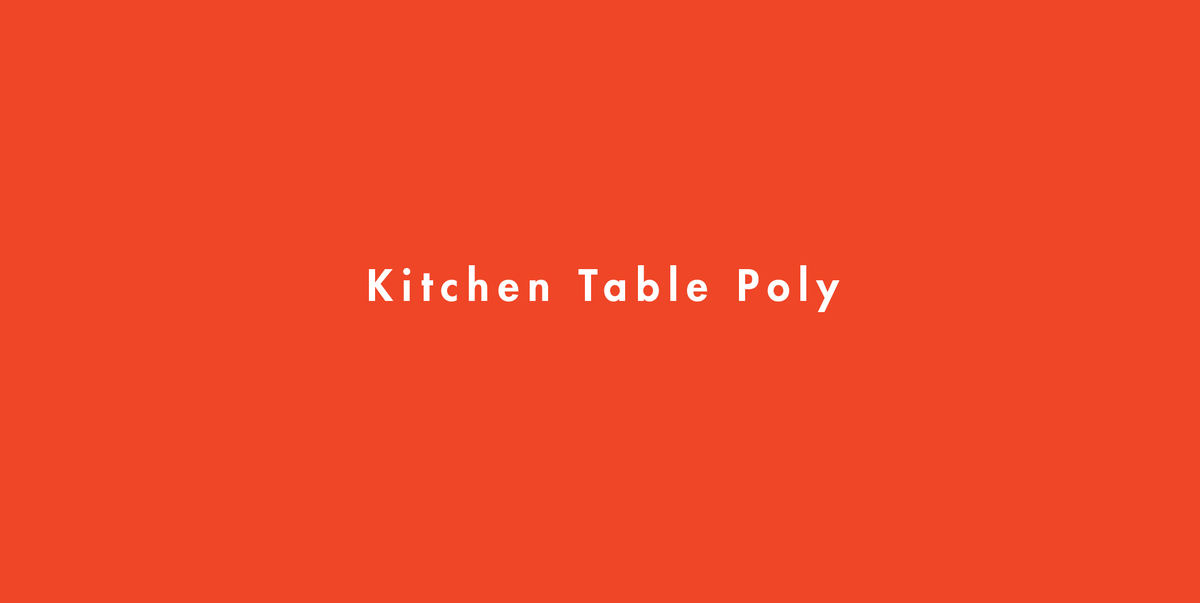Imagine you’re seated at a table surrounded by friends. You’re eating something sumptuous, like risotto, and drinking a nice bottle of wine. Everyone’s getting along. Now imagine all those friends are exes, plus a few of your exes’ exes, for good measure. For many monogamous people, this scenario can be a nightmare. It seems impossible that everyone would put their jealousy aside long enough to share a meal, much less a conversation. But for those who practice kitchen table polyamory, it’s something of a relationship requisite; all your partners—plus your partners’ partners—should be able to sit down at a kitchen table and genuinely enjoy each other’s company.
“Kitchen table poly means you’re not treading on eggshells,” says psychotherapist Amanda Luterman, founder of the Center for Erotic Empathy in Montreal. “There’s a grander appreciation for each other, not just a don't-ask-don't-tell or a silent acceptance. Everyone is really enjoying the mutual exchanges with one another.”
And while it’s not a relationship style that works for everyone, “anybody who's ever experienced a history of possessiveness or jealousy in their relationships knows it's a dream to feel like people can put their egos aside and appreciate the company of people who appreciate each other,” says Luterman.
Whether you’re a monogamy purist or you’re kitchen table–curious, here’s a handy guide to all things kitchen table polyamory—because risotto tastes better when shared with the people you love, and the people they love, too.
Related terms:
What is kitchen table polyamory and how does it differ from other forms of polyamory?
As with many queer and poly terms, kitchen table poly is defined differently by its practitioners. Laura Boyle, author of the Ready For Polyamory blog, writes that participants in kitchen table poly are encouraged, and in some cases, expected, to have a “close-friend, sibling-like relationship” with their metamours, or their partner's partners. Everyone in the polycule—or everyone in a given network of non-monogamous relationships—should be able to sit around a kitchen table and feel comfortable together, almost like a family. Whether or not this kind of arrangement involves sex or PDA in front of each other is not a given, and is decided by those in the polycule.
“It's very closely aligned with the ‘chosen family’ mentality of emotional safety and respect in an intimate, closely connected, mutually reliable way,” Luterman explains. “Everyone can coexist.”
Luterman says that for many participants, the concept of compersion, which she describes as “feeling joy that your partner is experiencing pleasure from somebody who isn't you,” plays a significant role.
Kitchen table poly is often referred to in contrast to “parallel poly,” which is a style of polyamory wherein individual relationships exist independently of one another, and there’s no expectation that any partner’s romantic or sexual relationships will overlap or intertwine. Boyle, however, views parallel and kitchen table poly more as “fuzzy umbrella terms we can work within” rather than as “strict opposites.”
How do you deal with jealousy in a kitchen table polycule?
For some folks outside of kitchen table poly circles, the idea of interacting with their partner’s exes or other partners is the stuff of nightmares. It's hard to trust you'll remain calm in the presence of people your partner is attracted to, and it can be easy to be overcome by jealousy, or what Luterman describes as “the fear of not being preferred.” That anxiety, she says, is totally normal.
To function without jealousy in a kitchen table poly–style relationship, good communication is often not enough. It also requires strong “emotion regulation” skills—or the ability to control (not neglect!) one’s emotions in a healthy way (a skill that can sometimes be learned in therapy).
Those skills “allow people to choose to be happy and to feel joy” in the presence of their partner’s partners, Luterman explains, by consciously creating some space between their feelings and their reactions.
How do you establish a kitchen table poly arrangement?
Boyle says kitchen table polyamory often happens by accident because partners with similar interests will get along and do things together organically.
She suggests being very clear with your partners about what you mean by “kitchen table,” because there can be a lot of potential gray areas. “Kitchen table poly” for some means they don’t mind having coffee in the same room as a live-in partner. For others, it carries the expectation that partners will build intimate or sexual relationships with other members of the polycule. “And there’s a lot in between,” she says.
How do I know if kitchen table poly is right for me?
Boyle emphasizes that sometimes, “people don’t jive with one another just because they have feelings for the same person, and that's okay.”
“Forcing folks who aren’t getting along to spend more time together in the name of ‘kitchen table polyamory’ or to suit an ideal is coercive behavior,” she says, adding that, as with any relationship, it’s critical to respect everyone’s boundaries.
Additionally, not everyone has the natural capacity for the selfless compersion needed to make a kitchen table poly setup successful, and that’s okay, too.
Ultimately, like most other polyamorous relationship styles, kitchen table poly is about sharing love with as many people and in as meaningful a way as possible. Or, as Luterman says, “The more the merrier. Love is plentiful, and love is renewable.” Whether you try it out for yourself is completely up to you. Remember: Your relationship can be customizable to you and your partner('s) needs, and if that looks like risotto around the kitchen table with everyone you're romantically and/or sexually involved with, then that's a beautiful thing.
Emma Glassman-Hughes (she/her) is a freelance writer for Cosmopolitan and a part-time editor at the Boston Globe. She was formerly a staff writer at Elite Daily, where she covered sex, intimacy, and queer topics. She is a graduate student at Boston University, where she’s pursuing a master’s in journalism with an emphasis on narrative and investigative reporting. She has a Twitter but her website is way more fun.












